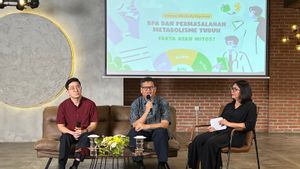JAKARTA - Recently, there has been controversy surrounding Bisphenol-A (BPA) related to its alleged impact on reproductive health, such as infertility to women and micropenis in men.
However, some of these claims have not been scientifically proven and have actually sparked excessive concern among the public.
In this case, dr. Ervan Surya, Sp.OG, an obstetrician from Tzu Chi Hospital, and Dr. Devie Rahmawati, M. Hum, lecturer and social researcher from the University of Indonesia, straighten out public understanding of this issue.
According to the analysis of a number of scientific studies between 2013 and 2022, there was no direct relationship between BPA and reproductive disorders. The study shows that BPA is not related to conditions such as endometrosis, the need for IVF programs, or polycistic ovarian syndrome (PCOS).
"We need to be careful in understanding the research that is spread on social media," said dr. Ervan.
BPA is a chemical compound widely used in the manufacture of plastics, including gallons of bottled drinking water that can be used many times. Regarding concerns, BPA can trigger premature childbirth, dr. Ervan explained, analysis of seven studies also found no link between exposure to BPA and premature birth.
He emphasized that the common cause of premature birth is more often associated with infection than exposure to chemicals such as BPA.
In the discussion, dr. Ervan also underlined that infertility is caused by various factors. In women, the problem with tuba filopi, ovulation disorders, or hormonal imbalances can be the main cause. Meanwhile, in men, conditions such as varicokel and sperm problems are the dominant factors.
SEE ALSO:
He reminded that smoking and alcohol consumption have been proven to reduce fertility, while the impact of BPA on infertility still requires further research.
Meanwhile, Dr. Devie Rahmawati highlighted how people are now easily exposed to false information or hoaxes. According to him, negative news tends to spread faster than positive information because people often do not realize the impact.
"Humans have a tendency to share things that touch emotions, whether it's happiness, anger, or disgust, because they want to look caring," said Devie.
He added that the desire to immediately convey information to family or friends often does not arise because of bad intentions, but because they want to feel 'heroic'. However, the lack of understanding and lack of one's experience about a topic makes him vulnerable to receiving misinformation.
"If a person doesn't have enough knowledge, it's easier for him to get caught up in incorrect information," he said.
In addition, Devie explained, the social environment also has a big influence on one's perception. People tend to be afraid of differences of opinion and prefer to follow the majority even though the information circulating is not necessarily true.
"Misinformation not only creates confusion, but can also trigger conflict in society," he added. Therefore, he invites writers, content creators, and readers to work together to prevent the spread of misinformation.
The discussion also emphasized the need to increase information literacy and develop a critical attitude towards digital content. In an era where the flow of information is so fast, the ability to sort out facts from hoaxes is very important so that people are not easily consumed by misinformation.
The English, Chinese, Japanese, Arabic, and French versions are automatically generated by the AI. So there may still be inaccuracies in translating, please always see Indonesian as our main language. (system supported by DigitalSiber.id)











